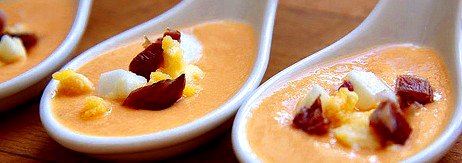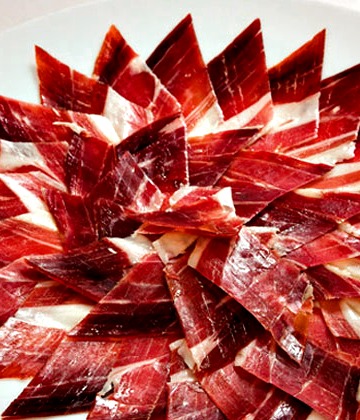Salmorejo
Similar to a traditional tomato gazpacho but richer and smoother, this delightful cold soup is typical of the Cordoba table. In Cordoba, they use dried country-style bread; plain rolls will also work.
- Serves 6
- Difficulty: easy
Ingredients
- 6 tomatoes, coarsely chopped
- 2 cloves garlic, chopped
- 1/4 cup sherry vinegar
- 1 cup extra virgin olive oil
- 1 tablespoon salt
- 2 day-old country-style bread rolls, about 3 ounces each, torn into pieces and soaked into 1 cup water for 10 minutes, or 2 fresh rolls, torn into pieces
- 1 egg yolk (optional)
- 3 hard-boiled eggs, peeled and finely chopped
- 3 ounces spanish ham, finely chopped
Preparation
In a large bowl, combine the tomatoes, garlic, vinegar, olive oil, salt, and soaked bread and any remaining water (or fresh bread) and mix well.
Working in batches if necessary, add the tomato mixture to a blender or food processor and process at high speed until smooth. For an specially smooth texture, pass the pureed mixture through a food mill fitted with the medium plate, and then, if desired, return it to the blender or processor, add the egg yolk, and process until thoroughly incorporated.
Transfer to a bowl, cover, and refrigerate for at least 4 hours, or until well chilled.
Just before serving, taste the soup and adjust the seasoning with salt. Ladle into chilled soup plates, garnish with the chopped eggs and ham, and serve.
You may be also interested in...
See also...
|
Jamon: There is nothing more Spanish than jamón serrano. This country ham is a national treasure shared in Spain by all walks of life. Cured for at least a year, it has a much deeper flavor firmer texture than its closest relateive, Italian prosciutto. Serve as a 'Tapa' with cheese and olives, or in your favorite Spanish recipe |
Andalusia recipes: The Romans taught the Andalusians how to cultivate wheat and vines and used the fish from the seas to produce the best "garum" in the empire. The Arabs taught the Andalusians how to grow fruit and vegetables. They used irrigation systems and improved the cultivation of olive trees and the production of oil. Furthermore, the Greeks, Phoenicians, Carthaginians and Visigoths left their mark on the art, science, culture and gastronomy of Andalusia.





